On Resentment: Religion, Government, and Art
Sunday, December 20, 2009

Once I thought everyone I had ever dated was steadfast in their beliefs and that this typified the lot of them. A dancer, an artist, a business man, a dentist--I thought they all knew, to some modicum of accuracy, how their lives would play out and what they wanted to "do" with their lives, a question I am being tired of asked by people who I know don't actually care. What I discovered however, was that I have always seemed to fall in love with people who pretend to know, yet always change their mind in private.
My favorite story of a private change of mind is Devadatta’s, the tormented cousin of the Buddha. Having tried to kill the Buddha twice and creating a schism in the Sangha (the community) once, he traveled to the Buddha’s monastery to make an apology. However, at the precise moment he internalized the error of his ways the ground opened beneath his feet and he was killed.
Every preacher’s dream.
I once composed a submission to a literary magazine in Minnesota. The submission contained over 13 poems and prose works, one of which was entitled “Hartford Jew,” an epic song that really had nothing to do with Judaism and everything to do with problems of race. When I finally received word from the magazine my heart jumped. However, it wasn’t an encouraging word. “Hartford Jew,” they said, on top of being poorly written, was racist, and they weren’t going to grace the pages of their magazine with a single thing I’d written. In the following nights I fantasized that the editor would send me a retraction letter that read something like this: “I never understood the complexity of race until I read your poem. Please forgive me for everything I’ve written. By the time you read this I’ll be dead.” And that, of course, is the only letter any writer ever wants to receive.
Later I put my feathered poetry pen back in the inkwell and decided to continue working on my novel, something I had been procrastinating on. I had crafted a novel about kids and their relationship to religion; and during what I believe is called “the writing process” I began to think about resentment. This comment is not as jejune as it might seem; A Serious Man may be a charmingly artsy film, but it isn’t about Judaism. But my novel was about resentment, which is to say the polemic between persons of varying ethos. What I then realized was that the central problem of the novel was not one of my own but that of my sister. Having watched her spiritual growth closer than any other human being I know I can quickly sum her dilemma up in the inability to reconcile the two chief ways of approaching religion: that being the faithful approach and the perfectionist approach.
Do we change our ways to accommodate the times, or do we buckle down and get traditional? This is the same question as should your church have a webpage? It is the same problem the Buddha faced during the vassana, or rainy season: while the sangha wanted to travel from place to place in India, expounding the Dharma, they quickly realized that it was more difficult to do so during a rain storm without stepping on submerged animal life. The perfectionist response, at the time, was philosophically utilitarian: it will do a lot of good if we spread the dharma, so we should temporarily suspend our belief in non-violence to do that. The faithfuls scoffed back: your willingness to suspend your faith highlights just how unfit you are to teach the dharma. Luckily the sangha had the Buddha, who was a moderate. His solution? If people want the dharma they can come to us.
The first Vassana retreat was held in Varanassi. We still have them today.
So now I wonder, how the Buddha so magically intertwines the liberal and conservative modes of thinking and how I could reflect that and, more importantly, how I could communicate that which I had no clue how to do to my spiritually struggling sister. The split seemed stark. You can be a perfectionist liberal and think people are basically good at heart or you can be a faithful conservative.
How could I not know that religion wasn’t all peaches and cream? The realization seems boggling to me now. After learning about how Catholics burned Christians, the Christians killed the Jews because the Jews killed Christ, and eventually the Pagans killed all Romans anyway, with that history in mind you will say “DUH” and you are right in doing so.
To that end the teachings of the Buddha have been neatly parsed into four noble truths, which are the only things I have retained from 13 years of schooling in Buddhist Philosophy at KCC and a three month stint at Bokar Monastery in Mirik India. (That is not to say that the rest is scintilla, but merely to point out that I’m burning out quicker that I thought I ever would).
In a nutshell, the four Nobel truths are, like the Constitution, a system of checks and balance. “The Turth of Suffering” (Dukkha) is that it wants to be king, just like the executive branch of government. “The Truth of Why We Suffer” (Samudaya) is like the legislative branch, that “representational” system of governance that tells you that, indeed, the problems of the world are your own damn fault. You voted them into office, didn’t you? So even though it may not seem like your fault, it really is. “The Cessation of Suffering” (Nirodha) is like the judicial branch, everybody resents them, but when you can’t work it out yourself you have a system of monarchic rule to lead the way. Those three truths—Dukkha, Samudaya, and Nirodha—are pitted against each other. You are sad, it’s a fact. It’s your own fault, it’s a fact. There is a way out, it’s a fact. In the mean time we have the eightfold path, which is the village that Hilary Clinton said it takes. The eightfold path is the relative truth, the way to live a life day to day if you can’t, which we can’t, understand the first three truths, simple as they might seem at first.
One last story: Chenrezig, vowing never to rest until he had freed all sentient beings from samsara, despite his most honest attempts, he realized that many unhappy beings were yet to be saved. After struggling to comprehend the needs of so many, his head split into eleven pieces. Amitabbah Buddha, seeing his plight, gave him eleven heads with which to hear the cries of the suffering of all the people he had yet to save (one wonders why). Upon hearing these cries and comprehending them, Chenrezig attempts to reach out to the suffering, but in doing his two arms shatter into pieces, like tubes of glass. Once more, Amitabha comes to his aid and invests him with a thousand arms with which to aid the suffering.
Now I ask: is any religious institution free from maladroitness?—no, but neither are you and I.
As to the role of religious institutions in the cessation of all suffering, answering that question is like asking what the role of government is in the individual’s search for life, liberty and the mythical pursuit of happiness.
I’m a conservative. I believe that the there have been few instances in history in which the government has intervened and the whole shin dig hasn’t gone up in flames. The same goes for art: I find that the characters in my novel are most happy when I don’t write them. (Yes, it’s true, the production of art is essentially an act of coercion). In this way, religious institutions have seen a long history of injustices to the truth: indulgences, crusades, violent physical jihad, cleansing, and even my beloved Tibetans have a history of being bullies. So the list goes on. But if the government is not to intervene then how will we go on? If religious institutions have no role in finding the “truth” then what are we to do?
Well, I have absolutely no idea, but I am overcome with a feeling that we just will. We need the government, if only to say “FUCK IT.” We need our institutions, if only to say “you are in the wrong.” So, taking the tragic view, as my sister and I both did, the question does not become “Is everything perfect?” but rather “How could it be better?” You can go on and on about faith, or perfection. Either way, you still have to sit in the same pew.
A Self-Conscious Family Portrait
Friday, December 11, 2009
Larry Sultan
“Practicing Golf Swing” 1986
From Pictures from Home
Irving Sultan: …That sounds good but it’s a load of crap. If anything, the pictures show how strained and artificial the situation was that you set up.
Larry Sultan was born in New York in 1946, but grew up in Los Angeles – an environment that much of his photographic work would later explore. He attended the University of California at Santa Barbara and received a BA in political science in 1968, and received a MFA from the San Francisco Art Institute in 1973. He currently teaches at California College of the Arts as a professor of Fine Arts and Photography. Sultan has published several books, notably The Valley (2004), and Pictures from Home (1992) a series of photographs of his parents Irving and Jean Sultan, mixed with home video stills, old family photographs and text. For this project Sultan photographed his parents for over a decade.
When Sultan first conceived of a project centered on his family in the early 80s, it was in the context of resurgent conservatism and the Reagan presidency. Defensive of the traditional patriarchal family structure and trumpeting “pro-family” values, the rhetoric of the New Right had risen to a new level of prominence with the election of its figurehead Ronald Reagan. Success and middle class affluence (typified by the growth of suburbia) had become the ideal in postwar America, but by the 80s faith in American exceptionalism and continuous economic growth had been shaken – the fantasies and facades of American suburbia had begun to unravel.
Larry Sultan: Sure, it was a charade, but I’m talking about how the image is read rather than what literally was going on when it was made. There’s a difference. Don’t you think that a fiction can suggest a truth?
Sultan sought to challenge these established mythologies of family and success and examine the deterioration of this representation of American life. He chose to scrutinize the complexities of our success-driven culture through an in depth study of his own family. In the 60s and 70s his father, Irving Sultan, personified the American Dream: he was a handsome, successful Vice President of the Schick Safety Razor Company. However, when he began working on Pictures from Home, his father had just been forced into an early retirement. Sultan was interested in exploring what happens when major corporations cast of old employees and specifically how his father dealt with from going from being a successful business executive to a powerless retiree.
New York Times art critic Charles Hagen called Sultan’s work in Pictures from Home “post-modern snapshots,” because they “combine intimacy with an implicit social analysis.” Beginning from a sociological angle, Sultan’s project evolved into something much more personal, a self-conscious family portrait that explores familial representation, identities, and power dynamics. In examining Sultan’s photograph of his father, “Practicing Golf Swing,” along with the text placed in conjunction with it, these nuanced issue are thrown into sharp focus.
The golf club suspended in the air imitates the antennae of the television set just as the plush green carpet mimics the grass outside. Both Irving and the woman on TV look down, each caught in the middle of doing something – swinging the club and orating respectively. The translucent curtains function in two ways – creating the impression of being in a studio, and consequently drawing attention to the photographic process, and secondarily providing an obscured, mediated link to the outside world, a function echoed by the presence of the television set. The layers of mimicry and illusion unsettle the viewer, drawing attention to the superficiality of this situation. But then the voice of Irving Sultan interjects and shatters our interpretation; the subject speaks! He says to his son, “I’m sure you had very high-minded interests in the image and the implications of swinging a club with the television on and the curtains drawn, but for me the picture is pure description.”
Irving: Maybe, but whose truth is it? It’s your picture but my image…
Sultan considers this series to be a collaboration with his parents. He deliberately includes challenging conversations about the photographs themselves and the process of photographing. The presence of his parents’ voices throughout Pictures from Home subverts Sultan’s own conceptions of the images and effectively questions the implicit documentary truth of his photographs. These interjections disrupt the photographer’s authority – and it is precisely this multiplicity of both agency and truth that attracted me to Sultan’s work to begin with. There is a dialogue between the text and the images: Sultan presents his melancholy view of suburbia, and his father questions that representation. There is an ebb and flow between Sultan’s constructed reality and the personal reality of his father. We know some photographs are posed, but we also know that these images are based on actuality. “Don’t you think a fiction can suggest a truth?” Sultan asks his father in the book. But his father is more concerned with whose truth his son is portraying.
Larry: There are no clear lines – I don’t know where you stop and I start. And it’s crossed my mind that perhaps I’m out to justify my own life, my choices, by questioning yours. Perhaps I’m an average old wound.
These considerations are unavoidable precisely because of the nature of the photographer’s relationship to the subject. The act of photographing one’s own family is distinct from photographing a stranger or a friend because of the photographer’s positionality. When Tom Bamberger curated the show “Blood Relatives” at the Milwaukee Art Museum, he said of familial photography:
Sultan’s work ultimately strives to reconcile this accountability by collaborating with his parents and giving them a voice. The photograph’s potential to misconstrue is counteracted by the subject’s repudiation. The viewer is left somewhere in between and is forced to synthesize and extract their own truth. However in the most straightforward sense, Sultan has said that behind this series there is a desire to come to terms with his past and to understand his parents. He initiated that process by simply taking a photograph, giving his parents space to react, and starting a conversation.To photograph family is to be held accountable; to photograph family is to have much more at stake… What is maddening about parents and children is they can never finally distinguish themselves completely from one another. There is a continuity of self that extends across the boundaries we usually reserve to define our individuality.
Labels: art, Larry Sultan, photography, Pictures From Home
Essays: Eastern European Porn, Reagan, and the Asian Effect
Thursday, December 10, 2009

How the political climate has constructed the gay male object of desire.
Is it an accident that Asian pornography became popular in the post-Regan aftermath? Is it an accident that Eastern European boys became commodified in gay pornography after the fall of the Berlin Wall?
With white-gays skyrocketing into strata of gentry and the solidification of a unified queer identity for men, came what Nicholas Radel calls “transnational gayness"--a sugary, dogmatic principle that is a “a celebration of gay identity as gay identification with the other.” The men who mouth these political clichés insist that gayness itself can transcend national and geographic distinctions. That gay man over there is the same as this one here because they both have anal sex.
Have we learned nothing from Gloria Anzaldua? who once said even the term "queer" erases our differences and marginalizes our individual struggle. And that's precisely what "Transnational Gayness" does: it conflates gender, which is plastic, with nationality, which is imagined.
 Gay men obviously don’t take the idea of transnational gayness too seriously. Pornography demonstrates the West’s representation of Eastern Europeans as the exotic-white-other, in search of identity, shape and focus, given to them by the jolly white westerner--nothing, I'm sure, you haven't heard before. It can escape you, particularly in moments when watching something like the infamous Bel Ami production Out of Athens. Here, the protagonist, quite randomly, meets a Greek tour guide who cant actually speak English, but who takes him on a tour. Ah Yes! The Greek pan leading whiteys through the maze of architectural ruins so he can have his COCK SUCKED. And there are more. Boy (1995), Viz (Tom Kurthy, 1995), and Sauna Paradiso (George DuRoy, 1994) all feature young men from the formerly communist countries of Eastern Europe and take place in the friendly yet foreign setting of the bathhouse (an originally European locale still foreign to most heterosexual men and indeed many gay men). In My Polish Waiter the protagonist reaches out to a nubile boy from the service staff, who again speaks little English. This veiled desire is emphasized and emblematized by a pivotal scene in which the waiter performs an exotic polish dance.
Gay men obviously don’t take the idea of transnational gayness too seriously. Pornography demonstrates the West’s representation of Eastern Europeans as the exotic-white-other, in search of identity, shape and focus, given to them by the jolly white westerner--nothing, I'm sure, you haven't heard before. It can escape you, particularly in moments when watching something like the infamous Bel Ami production Out of Athens. Here, the protagonist, quite randomly, meets a Greek tour guide who cant actually speak English, but who takes him on a tour. Ah Yes! The Greek pan leading whiteys through the maze of architectural ruins so he can have his COCK SUCKED. And there are more. Boy (1995), Viz (Tom Kurthy, 1995), and Sauna Paradiso (George DuRoy, 1994) all feature young men from the formerly communist countries of Eastern Europe and take place in the friendly yet foreign setting of the bathhouse (an originally European locale still foreign to most heterosexual men and indeed many gay men). In My Polish Waiter the protagonist reaches out to a nubile boy from the service staff, who again speaks little English. This veiled desire is emphasized and emblematized by a pivotal scene in which the waiter performs an exotic polish dance.
Gay sexuality itself, as an epistemological category, needs to be understood as a significant factor in the crisis of representation occasioned by the collapse of communism. The films aforementioned portray desire-objects (twinky, economically disenfranchised, nearly mute, slightly depressed Europeans) as having been there all along, waiting found in wanting. Their space becomes his space, the space of the transnational gay man.
The collapse of the Iron Curtain has lead to the reshaping of gay male desires. In the aftermath of the fall of communism, the U.S. has looked down at Eastern Europe as the locus for chaos and confusion. Within a post-Cold War framework pornography is tremendously recuperative. Nationality, politics, and sexuality maunder in order to keep the wires of culture smoothly functioning. The utopian vision of gay transnationality (might I add, a Leftist fantasy?) that energizes these films, a vision that is important to contemporary constructions of same-sex desire, obscures the extent to which the production of gay films about Eastern Europe is part of a larger, capitalist expansion into Eastern Europe in the post-Cold War period.
This reading of transnational gayness as being intimately connected to the political climate carries over quite nicely to other objects-of-desire as well. Take the mysterious Asian-effect: the phenomenon of some white men to only date and fuck Asian boys. Can we draw some connection between the Asian effect and political aftermath?
Yes. If the obedient, sexually curious woman was the trope before the Vietnam war, the obedient sexually starved woman was the stereotype after the Vietnam war. During the war the sex industry provided Vietnam with a new source of income. The business carried over to other south Asian territories, particularly Thailand, where they still flourish today. But the Asian American identity would not conform to the obedient prostitute stereotype up until the Regan administration. Asian Americans in America were used as the puppets for racial politics form the 1960’s in the dying flames of the civil rights movement, particularly on the West Coast. We throw around terms like ‘model minority’ today as if it had always been in place, but truth be told the american-asian object of desire didn't become such a model until this time. The Asian American was held up as a punching bag for resentment: When in 1965 The Negro Family publication came out, it accused black families of experiencing financial subordination due to “a lack of family values.” Asians were the opposite, according to conservative pundits. Asian success stories popped up in The New York Times Magazine and The U.S. News and World Report as "proof" of minority families pulling themselves up by the imagined bootstraps. If they can do then why can't you? seemed to be the tenor of these pieces.
The rhetoric seemed to carry over into my middle school too, where Asians were actually taunted for being good at things. Go figure. That particular brand of racism didn't do Asian slackers, such as myself, much good. For then the question became: Gosh, they're good at math, so why aren't you?
Of course in middle school I had no idea that my fate had long been determined during the Johnson administration. During the Regan administration, innovative technology caused massive job cuts, the conservatives insisted that a return to traditional values was a cure-all for these socioeconomic problems. Vietnamese shrimp wholesalers, Korean greengrocers, and Chinese computer whizzes were recognized as the epitome of ‘family values.'
The white-bourgeois-gay-male American identity cannot construct itself outside a framework of entitlement. Gay men have often had to sacrifice much of their personal lives in order to bare the burden of being able to sleep with whomever they want. Does this, and this is the question that boggles me, excuse them from proclivities such as the Asian effect? I have had to loose so much to be able to sleep with men that it's okay if I'm a little picky. After Millet, we know that the way we have sex is political, but for gay men it's a different game, particularly when removed from the discussion of Birth Control. As the Gay American Man stands on the edge of a cultural abyss, looking down into a pit of normalness, Transnational Gayness points to something rotten in the state of faggotry.
Nonfiction: Giving Thanks, or Much, Much Too Weak
Monday, November 30, 2009
“May I take your picture?” Whitehead asked us from across the table at Thanksgiving dinner. He was a burly, balding man with a delicate pink button up and a pair of cleanly pressed chinos. Alison and I had sat down near the head, close to where the thin linen tablecloth barley met the mahogany edge. We sat there without much intention of talking to anyone, but as we soon discovered it was difficult avoiding all human interaction.
Alison invited me to spend a few days with her in Rochester Minnesota. So, when given the choice between staying at school and freeloading during the holiday, I chose the latter.
Rochester is the kind of town everyone knows about but has never been to. Situated an hour and a half by car south of Minneapolis, it’s the third largest city in Minnesota outside of the Minneapolis-St. Paul-Bloomington metropolitan area. Perhaps most famously known as the home of the grandiose Mayo Clinic, downtown boasts a relatively impressive array of bars and restaurants while the surrounding residential neighborhoods are mostly quaint, upscale, and sprawling. It’s technically not a suburb, but anyone who has been there (and seen the boxy houses rolling on the hillsides) knows that it sure does look like one.
Alison did not hear Whitehead the first time around; she had been starring off at an old dog in the kitchen, wrapping her hair around her pinky finger, tilting her head to the side with a look of pained ennui on her face. I thought I heard a tiny gasp ejected from her lips when she turned back towards her dinner and saw Whitehead towering above us with a camera awkwardly poised at his face.
We leaned in, smiled, and the shutter clicked.
Whitehead is not part of Alison’s family, and as far as I know that was the first time the two had ever met. There were a lot of people Alison didn’t know at Thanksgiving, for the event wasn’t held at her house, or even a house of her relatives’, but Alison made a tradition of going to the neighbor’s every year, The Ulbricht’s.
The Ulbricht’s were a moderately wealthy couple, both doctors. Mr. Ulbricht was a foppy gentleman in a maroon sweater vest who made sure that everyone’s flute was never empty. Missus Ulbricht wore a knitted sweater underneath a red Christmas apron. They were, I imagine, a perfect sample of an aging Rochester couple—cute, happy, safe, and constantly throwing cocktail parties.
When asked why Alison went to Thanksgiving at the Ulbricht’s she always replied, “the oyster stuffing.”
Whitehead sat back down in his seat and grinned. He asked for our names. Alsion said hers first. When I said my name aloud he raised his eyebrows telling me that he probably would not be able to remember it, which I took to mean it was slightly too foreign. Later on he gave me an index card and told me to write it down.
When I asked Whitehead why he wanted to take our picture he explained, at length, that it was for a journalism project he was working on for his school, a prestigious east coast Ivy. Whitehead looked about ten years too old to be going to school, so I assumed he was doing graduate work. He told us that the project’s goal was to document different peoples’ experiences on Thanksgiving and that we were just the thing he was looking for. “You’re perfect,” he said. “You’re interesting.”
I’m not sure what Whitehead meant by “interesting,” and I was too shy to ask. After all, it was not my place to get offended, particularly when the hosts had been so kind in giving me champagne and appetizers of aged ham, provolone cheese, and access to a mound of crab dip the size of a premature baby. However, a quick look around the room could suggest a possible definition behind that loaded word.
Alison doesn’t dress like a normal twenty-one year old. She’s short and petite. Her hair is dyed dark brown, almost black. Her tortoise shell, square framed glasses sit on her peculiarly cute nose like a twig balancing on someone’s finger. She keeps a green scarf many sizes too big for her nuzzled around her neck. Her black pencil skirt tugs at her hips and presses up nicely against her pert buttocks. Her tiny legs, wrapped in grey stockings meant for an elderly woman, jut out from under the skirt as the limbs of a butterfly do from under its wings.
Alison was quite obviously the prettiest young-adult at Thanksgiving. Much prettier than the red head that recently completed the triathlon—she looked intimidating, and her wool slacks looked uncomfortable (it would not surprise me if they were either, for her face was constantly scrunched up like wad of paper). There was the broad shouldered Marine who constantly had a look of utter confusion on his face. There was the chubby seventeen year old swimmer who had hair that had been flat ironed so many times it looked as though it was going to fall apart at any moment.
So, what Whitehead may have meant by “interesting” was in fact an admission of Alison’s fascinating beauty. She’s naturally seductive, the kind of girl that could go days without showering and still look desirable. Besides, in a room full of crusty socialites it’s easy to see how Alison could be characterized as “interesting.” She’s a liberal arts college student. She’s in to photography and art. She loves Brazil. She has a wonderfully dry sense of cynicism. Of course, she’s “interesting.”
Oh yes, and then there’s me. I’m interesting because I’m not white. It’s the stock line I’ve had to repeat through the years: “Mymotherisfromamericabutmyfatherisfromnepal.” No matter how I spin it, or where I say it, the reaction tends to be generally the same. I haven’t the slightest clue how I wish people would react to me, and I certainly don’t expect something from them, mainly because I don’t know what it is exactly I want. But I can’t help this debilitating feeling of bitterness from rising up in me , boiling, ready to spit like a tea kettle. It never does. I don’t think it ever will.
I got up from the table to help myself to pie and coffee. The dog was still in the kitchen. I sat down next to him, sipping away. He looked like he didn’t want to be pet. This dog was so old, drooling, too tired to move. This dog looked like he wanted to be left alone. But I pet him anyway. I sipped my coffee again and grimaced. It was much, much too weak.
Post Party Poem
Sunday, November 22, 2009
Last night we toasted to sorrow
and threw back the vodka
one shot at a time,
nourishing the soul.
Today, my body told me
that it would love to give my soul
a piece of its mind.
Mortality Report: The POW Virus

THE FLEA.
by John Donne
MARK but this flea, and mark in this,
How little that which thou deniest me is ;
It suck'd me first, and now sucks thee,
And in this flea our two bloods mingled be.
Thou know'st that this cannot be said
A sin, nor shame, nor loss of maidenhead ;
Yet this enjoys before it woo,
And pamper'd swells with one blood made of two ;
And this, alas ! is more than we would do.
O stay, three lives in one flea spare,
Where we almost, yea, more than married are.
This flea is you and I, and this
Our marriage bed, and marriage temple is.
Though parents grudge, and you, we're met,
And cloister'd in these living walls of jet.
Though use make you apt to kill me,
Let not to that self-murder added be,
And sacrilege, three sins in killing three.
Cruel and sudden, hast thou since
Purpled thy nail in blood of innocence?
Wherein could this flea guilty be,
Except in that drop which it suck'd from thee?
Yet thou triumph'st, and say'st that thou
Find'st not thyself nor me the weaker now.
'Tis true ; then learn how false fears be ;
Just so much honour, when thou yield'st to me,
Will waste, as this flea's death took life from thee
The patient had lived a sedentary life in his Maine home for over 25 years, leaving only occasionally. Medical examiners scoured the property, looking for any clue as to the man’s peculiar condition. Seeing overgrown bushes, leaf piles, stacks of old lumber and scrap metal the examiners decided to trap several mammals near the patient’s property. Collections from the mammals and surrounding foliage yielded 31 and nine mammals. Of the nine animals collected, four were infected with the POW virus, a disease carried on ticks, yet doctors were not able to isolate the virus from any of the 31 ticks.
This was among one of the first documented cases of POW virus infection in the United States. It is probable that there are more POW infections that we can count, and the only way to tell is by proxy, through testing for the West Nile Virus. The POW virus has a morbidity rate of 10-15%. No therapy exists.
***
Stumbling out from a party, I saw Cooper fall into the grass behind the apartment complex on the corner of Portland and Saratoga. He pressed his hands into the grass and hoisted his torso higher. His legs flailed and sputtered like a fish’s might if a fish had legs and if a fish were dying. A cold resolution came over him and he just sat up, Apple Sauce style, and pulled a cigarette out of his pocket. He sat there for ten minutes, smoking and looking up at the starless sky. The slivered moon hung loosely on the horizon, like a giant toenail that had been clipped and jettisoned into the air. Cooper looked up at it and laughed quietly, a puff of smoke curling towards it.
I heard him burp. I heard him groan. And in the moment before he leaned back over the grass to vomit I wondered if it was cold enough for the ticks to be out. Had he been out a moment longer I would have walked him home, but I didn't know the way and wiping the vomit from his lips he sprang up and ran towards the median.
TRACK MANGOES RADIO: The American Man at Age Ten
Sunday, November 15, 2009
"My barn having burned to the ground, I can now see the moon”
An in progress series using long exposures and low light at night to capture dilapidated barns and agricultural buildings across the Midwest. More to come.



2C-I Dreams
Friday, November 6, 2009
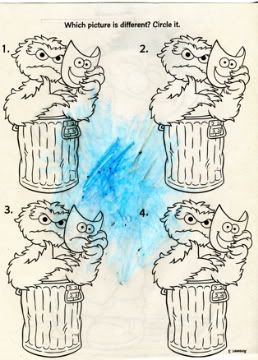
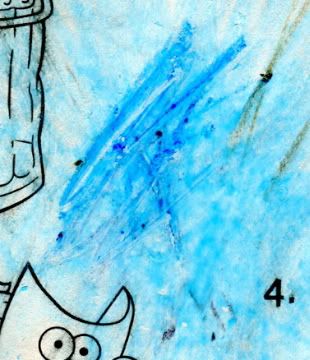
Oscar doses.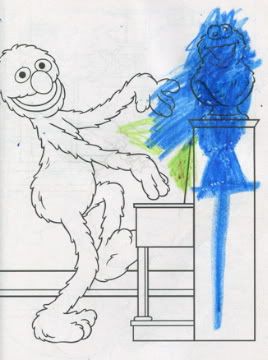
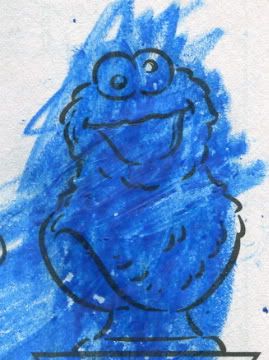
Oscar watches Grover play the piano. Oscar doesn't understand why the bust of Cookie Monster looks so terrible.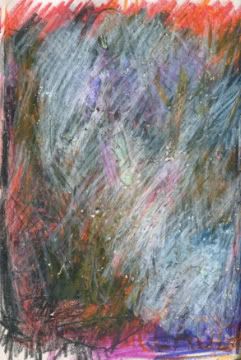
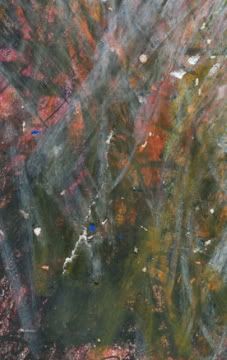
Strange things begin to happen.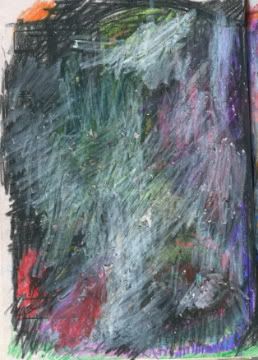

Strange things keep happening and cease to stop.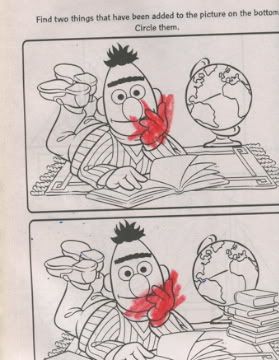
Oscar turns around and notices that Bert has been watching him.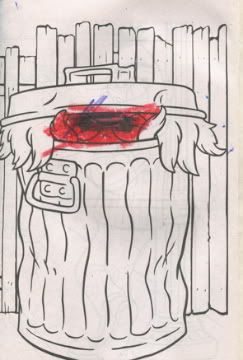
The come down.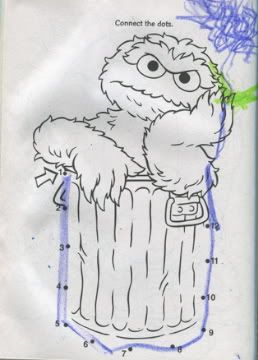
The morning after.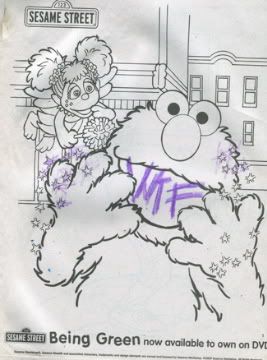
Oscar goes back to school and finds that Elmo is seeing things too. And the story goes on.
Fiction: The Mysterious Death of Lucas Bartholomew Cooper
Sunday, November 1, 2009

It was in the early morning of a crisp autumn day that Miss Abbey Sinclair stopped to stretch her aching calves near the East Bank of the Mississippi and saw Lucas Bartholomew Cooper’s body, floating face down in the water, lapping up against some driftwood. She saw the body through her chubby legs as she bent over to strike a yoga pose. Shrieking, she immediately trotted back to her house to call the authorities.
The body looked very fresh when the forensic unit fished it out of the water. The boy might have been alive, for his skin was supple and still the color of an olive. An autopsy confirmed that he died by poison, though they would not say what kind.
Clio Mendelssohn had never known Cooper to be the suicidal type. So it came as a surprise to her when she found the obituary heralding his death. Seeing his face in print, she vaguely recalled the one or two classes they had had together during their four years of college. Once, at a party, she tried to seduce him, only to find out in a drunken display that he was a homosexual.
She didn’t plan on conducting a private investigation into his death, but something in her wanted to know what that poison was. It was on the day she read the obituary that she found herself standing at the front door of the house on Corsair Boulevard, rented out by one of Cooper’s ex-boyfriends, an acidic fop named Patrick Little. Patrick lived there with his boyfriend, Mason, whom everyone knew to be a manipulative sociopath. By talking to Cooper’s current boyfriend, Hitch Hickey, a painfully awkward graduate student studying math, she learned that Cooper had been at the house on Corsair Boulevard the night before his death.
Standing on the porch, facing the front door, Clio rang the doorbell. Patrick Little appeared in jamb and leaned against it. He was a tall, skinny boy with dark, floppy hair that hung down in front of his face like ivy vines hanging off a stone arch. He told Clio that he saw Cooper that night, saw him two timing with Mason. When she asked what he meant, Patrick told her to ask the culprit himself. He was upstairs sleeping.
So Clio mounted the stairs to the bedroom and found herself in a dimly lit hallway, lined with filthy carpets and old photographs hung in crooked frames. The door to Mason’s room was slightly ajar. She could hear him coughing, hacking up pieces of his lungs, and groaning, as if he was recovering from some incurable illness. She knocked quietly and Mason beckoned her inside.
Mason sat up rigidly on the mattress in his empty room with a lit cigarette dangling between his fingers. Clio stood in the doorway and asked him what he and Cooper had talked about that night. Mason told her that they had talked the night away, chain smoking on the porch. “He kept telling me about his petering romance with some nerd from the U,” Mason told Clio. “I said, I told him, I said that no man would come ‘round to his ex’s house looking for a quick one. No man would mess with somethin’ so stable. But I told him he wasn’t no man anyway. I told him he was a scared little boy looking for damaged goods ‘cause he thought they were fun. Scared college boy come ‘round here to the workin’ class homes, lookin’ for a fucked up soul. Rich bitch found was he was lookin’ for didn’t he? He told me he felt awful, and I said, fine, what are you gon’ do about it? You gon’ kill yerself? I told him that’d be the day.”
“And then he did,” Clio said sternly. A moment of silence passed between them and Mason took a long drag of cigarette.
“That he did,” he continued. “I told him he could find syringes in the bathroom, dirty ones, and that under the sink was a bottle of Drano. Straight to the neck, I said, was most effective. No man throws himself off a bridge, you know? If a man wants death in ‘em. If he wants it hard. And I saw it in him. I saw it and I don’t feel sorry I did.”
Clio left the house unsure of whether or not to contact the police. She walked down to the river and sat on the log where they had found the body. The sun was setting over the Lake Street bridge and she peered up at it. She pondered with alarming composure the scene of Cooper and Mason on the front porch.
Before she left the house on Corsair Boulevard she asked Mason why he did it.
“Why’d I say what I said?!” Mason laughed. “I didn’t say what I said because I wanted to kill no one. I didn’t say what I said because I knew Coop to be a fragile thing. I didn’t say what I said to piss off Patrick or Hitch or nobody.”
“So why’d you do it?” she asked then.
Mason grinned and chuckled. “Because he listened.”
Essays: His Mother's Makeup
Monday, October 26, 2009

When Mrs. Klimbacher asked me whether or not she should worry that her four-year-old son asked her to buy him an Easy-Bake oven, I told her that she probably didn’t have to but that it might feel nice if she did.
I started babysitting for Mrs. Klimbacher’s fraternal twins, Richie and Hans, three years after she divorced her husband. From an early age Hans exhibited a fondness for football, while Richie preferred far more delicate endeavors. On a crisp fall day I recall seeing Hans on the front lawn, red leaves stuck to his black fleece and woolen cap. He circumambulated the grass, tossing a Nerf ball and reciting football penalties. Now I don’t claim to know much about football, but I know the things Hans belted out into the autumn air had absolutely no meaning whatsoever; they were simply a hodge-podge of phrases referees might say, like “First down!” and “Five yard penalty!” I then recall going into the house, setting my shoulder bag on the kitchen counter, and scouring for Richie. I found him sitting at his mother’s vanity and applying her makeup to his face. He had one of her silk scarves wrapped around his forehead like a turban and smelled distinctly of her Crabtree and Evelyn sandalwood perfume.
The thought crossed my mind then, and it would continue to cross my mind as I babysat for the Klimbachers, that Richie may have been—brace yourself—gay. When I watch Richie lavishing in beautiful things, the necklaces and the Sunday hats, I cannot help but contemplate the inborn difference between him and his brother. While Richie was pretending to be cat woman Hans was killing Nazis in the backyard. How, at such an early age, could two boys differentiate their tastes so stridently?
Richie never has expressed an interest in men or in anything technically homosexual. Yet I cannot help but observe my tendency to color him thus. He was born, I think, not as a homosexual, but with a hyper-sensitivity to color and form, smells and sensations. I know he will grow up with homosexual tendencies, but I also know he was born with good taste. Is it a coincidence that so many of our brothers are tainted with such a cursed flaw?
When I babysit for Richie I never discourage him from playing with beautiful things. I think it might traumatize him if I did. Instead, I tell him that, yes, that smells delightful, and yes, that looks fantastic, and yes, he does look dashing in fire engine red. I do this because, to him, the vanity is a temple—a sanctuary from a world that discourages his odd form of expression. Why should I hinder him from playing with his mother’s makeup, which, to him, is essentially paint on the canvas of his face.
Labels: art, essays, homoseuxality, nonfiction, queer, sex
Fiction: Prosems
Monday, October 12, 2009
It was eight o'clock in the morning when Cooper walked past him, sitting at the base of a fat clay colored column outside the library doors, waiting for them to open.
No one had ever known the library to open on time. All anyone ever knew was that a woman named Kathy would turn the lights on in the foyer and walk up to the doors, and you'd stand on the other side, watching her bony hands rummaging through the pockets of her tech jacket for a giant ring of keys you knew couldn't be that difficult to find.
The first Minnesota snow had fallen the night before. It came without a real warning (other than that one on the weather channel) and it fell late at night while most of the students on campus had been asleep. Cooper would have missed it, but he was rolling on Vivance from 2:30 in the morning until then, writing a paper whose thesis seemed to slip farther and farther away from him the harder he rolled. When he put the little white pill on his tongue in the middle of his empty room, it was snowing then. When he sat himself on the sofa in his living room, it was snowing then too.
No one had ever known if her name was really Kathy either. It just said that on her jacket. Cooper had a jacket that said Kathy on it too. He bought it at a thrift store for a few dollars because he thought it looked good and funny because it had the name of somebody else on it. It was a green puffy thing with white stripes and little snap buttons. It took him a moment to remember that he was wearing it. He wondered if the real Kathy would get upset. But she just opened the doors and let three freezing students scurry inside where they shook the snow from their jackets. Kathy stepped past them and pulled a box of Marlboro's out of her jacket, shoving the keys back inside. Cooper wondered if there was a particular kind of person who smoked those cigarettes. He hadn’t smoked enough in his short life to know. But if there was, he thought, I think Kathy would be the kind of person who would.
Cooper’s breath curled up in the air as he watched Kathy pull a white lighter out of her pocket and hold it for a minute, starring at the snow falling off a tree way off in the center of the lawn. She was a short woman with a boy’s haircut. She must have been about 52, but then, Cooper thought, if she's been smokin' for awhile she could be 30 and I wouldn't think any different of it. Kathy was skinny. Her waist, perhaps, was about the circumference of a frying pan. You wouldn't know that though unless you looked at her legs, which stuck out from her jacket several sizes too big. Yeah, Cooper thought, several.
Kathy wasn't glancing at him, nor was she glancing at Cooper, even though he was still sitting there long after the doors had been opened. The three of them lingered outside the doors in silence. He stood up and disappeared behind the glass doors. Cooper followed him in, but before he walked through he checked his reflection in the glass. His face looked pursed and angry, and he wondered if it was the Vivance or if he was just constipated with schoolwork. The jacket still said Kathy, alright, although the white letters were begging to peel off of it. And through the faint image of his face in the glass he could see the boy taking a sharp right and heading off to the computer lab. Cooper chuckled to himself and laid his bare hand on the door handle. If it was anything but metal it would have been frozen, but metal in Minnesota just gets colder and colder to the point where you can't even touch it anymore. Metal gets so cold in Minnesota you wish it was ice, because ice would be warmer. Holding on to the door handle, Cooper looked at his reflection one more time, only this time he saw Kathy, peering over her shoulder, smoke hanging on her lips, starring at the back of Cooper's head. Cooper shook off a notion that suddenly popped into his head and walked through the doors. By the time he was in the library he had forgotten completely what the notion was.
He worked at the desk in the computer lab, though he usually just read books and didn't know the answer to questions. He was a tall boy, skinny, with a swooping pompadour that looked like a tsunami wave. He had a constant smirk on his face, as if at any moment he might break out into a monstrous grin or a bellowing laugh, bearing his teeth, several of which stuck out at frightening angles. A bright green name tag hung from his neck, strung up by a white cord.The boy's name was Lenox Marcuse.
"Excuse me," Cooper said, laying his frigid hands on the desk. "I'd like to check out a lap top."
Marcuse looked up from the computer screen in front of him, blankly. "What kind?"
"The working kind," Cooper said. Marcuse was silent for a moment before telling Cooper that he had meant what kind meaning Mac or PC. "Oh. Um. Mac, I guess."
Marcuse disappeared underneath the desk and brought up a white computer. Cooper slid him his ID and Marcuse held it under a small, flashing red light which beeped. "All set."
Cooper removed the card from the boy's fingers and saw that he was grinning. "Do you know that woman who works out there?"
"Kathy?"
"Yes that woman."
"I know of her," Marcuse said.
"Where is she from?"
"She's native."
"So I she doesn't care 'bout the cold? Right? Natives don't care about that kind of thing."
Marcuse's grin faded away. "No," he said, as if he had been wronged, as if someone had asked him to do something he did not want to do. "I'm a native," he said. "I care about the cold."
"You do?"
"I'm not some rock. I'm not some unfeeling piece of fat. I care about the cold. I hate the cold. I hate it. I hate how it kills the leaves before they even get a chance to die."
Cooper picked up his laptop and prepared to leave. Before he turned around he told Marcuse, "I meant. Well. I meant. Okay."





